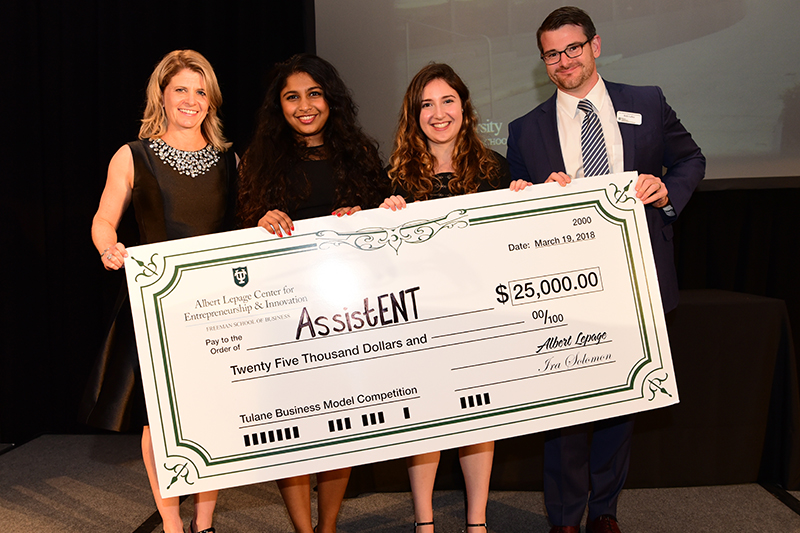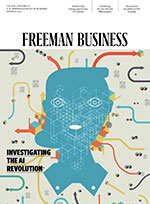
AssistENT, developers of an innovative device to help people suffering from restricted nasal breathing, was the grand prize winner at the 2018 Tulane Business Model Competition. Pictured, from left to right, are Lepage Center Director of Strategic Initiatives Stephanie Kleehammer, AssistENT’s Pooja Nair and Talia Kirschbaum, and Lepage Center Executive Director Rob Lalka.
Ahealth-care startup with an innovative device to help people breathe a little easier was the big winner at the 18th annual Tulane Business Model Competition. The contest, an annual presentation of the Freeman School’s Albert Lepage Center for Entrepreneurship and Innovation, took place on April 19 at the business school.
AssistENT, a business started by biomedical engineering undergraduates at Johns Hopkins University, won the $25,000 grand prize for developing the N-Stent, a breathing aid designed to help the more than 40 million Americans who suffer from restricted nasal breathing. The patent-pending device offers an affordable and effective alternative to surgery, and unlike overthe- counter nasal dilator strips, the N-Stent is undetectable and can be worn 24 hours a day.
“I think their technology is very innovative,” said competition judge Albert Lepage (MBA ’71), retired co-chairman of Lepage Bakeries. “It meets a tremendous need, it has a very large audience, and there’s easy entry into the marketplace. I thought
they were great.”
Uchooze Lunchbox, a startup based at the University of Arkansas that uses an online platform to enable kids to choose their own healthy school lunches, earned second-place honors and a prize of $10,000, and Boost Linguistics, a company started by Drexel University students that uses artificial intelligence to help marketers deliver more effective content, took home third
place and a prize of $2,500.
“It was very impressive that all three of our finalists are tackling big problems to which many of us can relate,” said Ira Solomon, dean of the Freeman School. “I think that appealed to our judges and resulted in a lively, very competitive final round.”
“Compared to when I last served as a judge, which was about six years ago, the quality of this year’s three finalists was stunning,” added Marianne Van Meter, managing director of Legacy Capital. “The amount of work they put in and the research they did was unbelievable, and the fact that undergrads at Johns Hopkins developed the winning product was very impressive.”
As he nears the end of his first year as executive director of the Lepage Center, Rob Lalka said he’s very optimistic about the future of entrepreneurship at Tulane. While no Tulane-based startups made it to the finals this year, more than a dozen Tulane teams entered the competition and two reached the semifinals.
“There’s tremendous interest in entrepreneurship, not only at the Freeman School but all across Tulane,” Lalka said. “The new university-wide website — entrepreneurship.tulane.edu — was a first step toward meeting that demand, and we’re going to build on that this fall with new programming offered through the Lepage Center’s student venture incubator. I think we’re going to see more and more startups coming out of Tulane in the next several years.”


